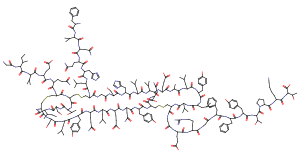
Insulin (human) is a polypeptide hormone that regulates the level of sugar (glucose) in the blood and is produced by beta cells of islets.
*The product is unstable in the solution state, so it is recommended that you use it now and use it as soon as possible
This product solution cannot be autoclaved.
It is also soluble in 125mM NaHCO3. Alkaline storage solutions are not recommended as high pH increases deamidation and protein aggregation.
General recommendation:
1. Do not prepare concentrated insulin solution because of poor solubility and the formation of polymers.
2. Adjust acidic pH to promote solutization and minimize the effects of neutral ph-binding proteases. For added protection, acid protease inhibitors may be considered.
3. The solution was aseptically filtered using a 0.2 micron low protein binding filter. Avoid aeration and/or blistering during solubilization and filtration as this may lead to protein denaturation.
4. Store at 2-8°C for 8 hours.
5. Do not heat more than 30°C and do not freeze.
6. Recommended working concentration of insulin is 1-10 μg/mL.
As an alternative, insulin solutions can be formulated with phosphate buffers (PBS). The above products were dissolved in 1mg /mL PBS solution. Shake gently at room temperature for 1-2 hours. No whirlpool. The solution is ready for cleanup. Prior to evaluation, follow steps 3-6 for final processing.

Food Res Int. 2023 Feb 14.
N-acetylcysteine promotes the proliferation of porcine adipose-derived stem cells during in vitro long-term expansion for cultured meat production
Insulin (human) purchased from AbMole

Biorxiv. 2023 Dec.
GTPase-activating protein ARAP1 regulates circular dorsal ruffles as a nutrient uptake mechanism in the Hep3B hepatocellular carcinoma cell line
Insulin (human) purchased from AbMole

Cell Commun Signal. 2022 Jul 7;20(1):102.
Circular dorsal ruffles disturb the growth factor-induced PI3K-AKT pathway in hepatocellular carcinoma Hep3B cells
Insulin (human) purchased from AbMole
| Molecular Weight | 5807.57 |
| Formula | C257H383N65O77S6 |
| CAS Number | 11061-68-0 |
| Solubility (25°C) | Water 10 mg/mL (Need ultrasonic and warming and adjust pH to 2-3 with HCl) |
| Storage | -20°C, protect from light, dry, sealed |
| Species | Mouse | Rat | Rabbit | Guinea pig | Hamster | Dog |
| Weight (kg) | 0.02 | 0.15 | 1.8 | 0.4 | 0.08 | 10 |
| Body Surface Area (m2) | 0.007 | 0.025 | 0.15 | 0.05 | 0.02 | 0.5 |
| Km factor | 3 | 6 | 12 | 8 | 5 | 20 |
| Animal A (mg/kg) = Animal B (mg/kg) multiplied by | Animal B Km |
| Animal A Km |
For example, to modify the dose of Compound A used for a mouse (20 mg/kg) to a dose based on the BSA for a rat, multiply 20 mg/kg by the Km factor for a mouse and then divide by the Km factor for a rat. This calculation results in a rat equivalent dose for Compound A of 10 mg/kg.
| Related Products |
|---|
| DiosMetin 7-O-β-D-Glucuronide
DiosMetin 7-O-β-D-Glucuronide is an antioxidant constituent in the fruits of Luffa cylindrical. |
| Bendazac L-Lysine
Bendazac L-Lysine is an aldose reductase (AR) inhibitor, which can be used to inhibit the activity of AR in the eye to prevent cataracts. |
| Ro5-3335
Ro5-3335 acts as an inhibitor of core binding factor (CBF) leukemia. Ro5-3335 is a RUNX1-CBFβ interaction inhibitor that represses RUNX1/CBFB-dependent transactivation. |
| Bendazac
Bendazac is an oxyacetic acid with anti-inflammatory, antinecrotic, choleretic and antilipidaemic properties. Bendazac acts by preventing protein denaturation. |
| Dexamethasone palmitate
Dexamethasone palmitate (DXP) is a proagent of Dexamethasone. Dexamethasone palmitate can be used for the research of inflammation. |


Products are for research use only. Not for human use. We do not sell to patients.
© Copyright 2010-2023 AbMole BioScience. All Rights Reserved.
